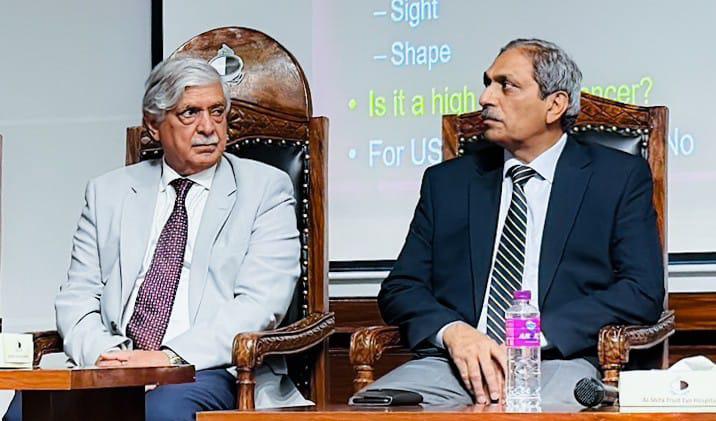Staff Report
ISLAMABAD: Al-Shifa Trust, a leading eye care organization in Pakistan, has called for mandatory eye screenings in schools, stressing that early detection and treatment of vision problems can significantly reduce the risk of childhood blindness.
Speaking to the media, Maj. Gen. (Retd) Rehmat Khan, president of Al-Shifa Trust, said that while some eye health initiatives exist, they are not mandated by national policy and mainly depend on periodic campaigns or voluntary participation. This, he emphasized, is not enough to address the growing burden of childhood vision issues.
He announced that a formal letter would soon be sent to provincial and federal governments, urging the implementation of a coordinated national eye screening program in all schools and madrassas.
Apart from developed world, some countries in Latin America and South East Asia have successfully reduced childhood blindness through compulsory school eye examinations. Pakistan still lacks such a national program, he said.
Al-Shifa Trust has already taken significant steps in this direction, screening over 175,000 schoolchildren in the past year through more than 550 free eye camps in underserved communities. The trust aims to reach over 2 million patients and perform more than 120,000 eye surgeries in the coming year, he informed.
On one hand, many patients cannot afford treatment, and on the other, there are people with the resources to help. Now is the time for those who can to come forward, said Maj. Gen. Khan.
He also highlighted the trust’s expansion plans, which include new hospitals in Lahore, Haveli Lakha, and Gilgit, as well as a dedicated Eye Cancer Centre in Lahore.
Prof. Dr. Wajid Ali Khan, Chief of Medical Services at Al-Shifa Trust Eye Hospital, underscored the scale of the challenge. With over 250 million people in Pakistan, more than half of whom are children and adolescents, no single organization can handle the country’s entire eye care burden.
He proposed a collaborative national strategy, suggesting that every medical college adopt a district and take responsibility for eye screening programs among vulnerable populations.
Al-Shifa’s screening data revealed that 10 percent of children had convergence insufficiency, congenital cataracts and myopia, a common condition in which light is not properly focused on the retina.
Dr. Wajid said that an effective school-based eye health program should include trained health workers in every school or provide basic training to teachers to identify vision issues and refer children for specialized care if needed. Early intervention, he stressed, can prevent permanent vision loss and significantly improve educational outcomes.
With public support and government commitment, Pakistan can move toward eliminating avoidable childhood blindness, securing a healthier future for the next generation.
Nearly 80 percent of patients across trust’s facilities in Rawalpindi, Chakwal, Kohat, Sukkur, Muzaffarabad, and Gilgit receive free treatment.
In addition to providing clinical services, Al-Shifa Trust is placing special emphasis on community awareness and school-based education to help families and teachers recognize early signs of vision problems in children. The trust is expanding its outreach to serve masses.
These efforts aim to ensure that vision care becomes a routine part of child health, especially in underserved areas. Experts warn that if left untreated, vision issues can hinder a child’s academic performance, reduce confidence, lead to social difficulties and even result in permanent disability.
Al-Shifa Trust believes that addressing childhood vision problems requires a united national response. A coordinated effort involving public institutions, private partners, and philanthropic organizations is essential. The trust has urged policymakers to prioritize eye health as a critical element of child development, educational success and long-term national productivity and wellbeing.

